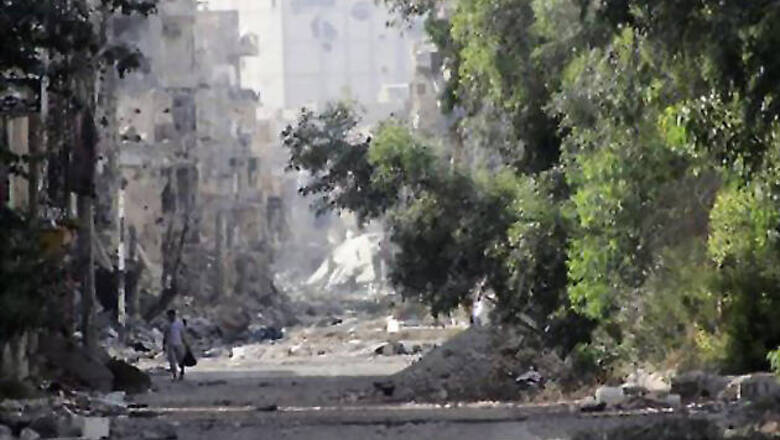
views
Differences between Russia and the West mean an international peace conference on Syria is now unlikely to be held before August, a source at a meeting of Group of Eight leaders said on Tuesday as heavy fighting was reported in Aleppo.
Several fronts in Syria's biggest city that had been relatively quiet for some time were now experiencing heavy fighting as government troops have gained ground this month, according to an opposition monitoring group.
Efforts to bring representatives of President Bashar al-Assad and the rebels fighting to oust him to the peace table in Geneva next month ran into trouble after G8 leaders clashed with Russian President Vladimir Putin at a summit in Northern Ireland.
"You're close to a seven to one position on Syria and clearly Putin doesn't hold back with his views," the source said, saying the peace conference sponsored by the United States and Russia was now unlikely to take place in July as planned.
Russia, which has given Assad diplomatic cover as well as weapons, urged the West to think "three or four times" before going ahead with plans to arm the rebels fighting to topple the Syrian leader.
G8 leaders were likely to urge progress on holding a Syrian peace conference, which Moscow believes is the only way to resolve the Syrian conflict, Russian deputy Foreign Minister Sergei Ryabkov said.
Moscow had ensured that Assad's fate in any post-war transition -- the rebels want him gone -- would not appear in the final G8 summit communique.
Moscow could not accept that Assad had used chemical weapons against the rebels, an allegation that had tipped Washington's hand in deciding to arm the anti-Assad fighters, Ryabkov added.
Putin has been openly at odds with U.S. President Barack Obama at the summit, a position likely to play well at home for a Kremlin leader happy to see himself portrayed as standing up to the West.
FIGHTING IN NORTH
As peace efforts have faltered and arms have flowed into rebel hands, heavy fighting on the northern front lines in an around Aleppo has resumed as government forces seek to build on battlefield gains further south.
Those backing the rebels - including Britain, France, Turkey and Arab countries as well as the United States - were driven to intensify support in recent weeks to rescue the rebellion after Assad's forces scored important military gains.
Just a few months ago, Western countries thought Assad's days were numbered. But last month he received the open support of thousands of fighters from Hezbollah, the powerful Iran-backed Shi'ite militia in neighbouring Lebanon, which helped him capture the strategic town of Qusair from the rebels this month.
Rami Abdelrahman, head of the anti-Assad Syrian Observatory for Human Rights, said there were clashes in the eastern Sakhour neighbourhood of Aleppo as well as in the Old City, which sits between government and rebel-held territory.
An opposition activist said rebels and government forces were fighting in the alleyways of Aleppo's historic Old City.
The Observatory also reported clashes in Damascus, Homs, Hama, Deraa and the eastern city of Deir al-Zor.
In Idlib province, in the north west, a rocket hit the house of a prominent religious figure who is known to support pro-Assad militia, killing 20 people, the Observatory said.
The recent upsurge of fighting has turned Syria's war into a sectarian conflict between Sunni Muslim rebels and members of Assad's Alwaite sect, an offshoot of Shi'ite Islam, and their Shi'ite Hezbollah allies.
Lebanon on Tuesday accused Assad's forces of driving Sunni Muslims across the border into Lebanon.
Syrian forces had committed what was "tantamount to ethnic cleansing next to the Syrian-Lebanese border", Wael Abu Faour, the Lebanese caretaker minister for social affairs, told Reuters.
"(Assad) is trying to displace all the Sunnis to Lebanon and this is why I expect to have more displaced people," he said.
The United Nations says 93,000 people have been killed in Syria and 1.6 million Syrians have fled abroad. Lebanon, the smallest of Syria's neighbours, has taken in more than half a million Syrian refugees.















Comments
0 comment